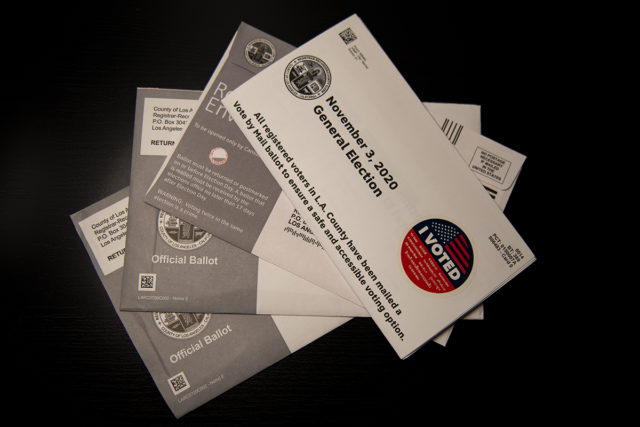This post was updated Nov. 1 at 7:57 p.m.
Out-of-state students who returned to Westwood may have a difficult time casting their ballots, UCLA students and professors said.
Absentee or mail-in ballots are the only way non-California residents who have returned to UCLA can participate in the upcoming election. But out-of-state students living in California may have to deal with inconsistent voting laws, rejected ballots and late mailing times.
Jack Colby, a second-year biology student from New Jersey who returned to Westwood, said he had trouble determining how voter laws worked in both his home state and California.
“Every state is different,” Colby said. “You have to be looking at the laws of not just your state, (but also) the state you’re living in at the moment and they might conflict with each other. That’s where it can get confusing.”
With the recent uncertainty regarding the state of the United States Postal Service and the ongoing pandemic, Colby said he was worried his ballot may have gotten lost or would have been submitted late if he sent it through the mail.
“I sent a letter (from California) to my friend who lives in San Diego and it took a week to get there and it’s just a little letter,” Colby said. “Something going all the way across the country would take even longer.”
Different states also have different cutoff dates for when the mail-in ballot must be received. While some states require the ballot to be received by Nov. 3, others have a later deadline for when ballots must be received by election officials.
Mail-in ballots in New York need to be postmarked by Nov. 3 and received by Nov. 10. But in Texas, mail-in ballots need to be postmarked by Nov. 3 and received by Nov. 4.
The Supreme Court ruled against a Wisconsin federal judge order that stated absentee ballots postmarked before Nov. 3 but received within six days after Election Day could be counted. While Supreme Court Justice Brett Kavanaugh claimed such ballots could lead to incorrect election results, Mark Peterson, a public policy, political science and law professor, said this is not true.
“(Kavanaugh wants) to be able to say that the election results are what they are at the end of the Election Day and that votes coming in (after that day can cause) conflict,” Peterson said. “(Votes coming in after Election Day) don’t flip the results, they are the results.”
Any ballot that is postmarked before Election Day and received by election officials before the state’s respective deadline is valid, Peterson said.
However, even if the appropriately postmarked mail-in ballot reaches the corresponding state in time, Peterson said there can still be issues with the ballot that can make election officials deem it invalid.
“First-time voters and particularly younger voters have the highest percentage of ‘mistakes’ in completing their mail-in ballot,” Peterson said. “They may forget to sign it, or they forget to put it in the secrecy (envelope).”
[Related: Study finds younger voters’ mail-in ballots more likely to be rejected]
Some states, including California, will let voters correct mistakes on their ballots, Peterson added. But this process may not be feasible for the voter if they are hundreds of miles away from their home state, which is the case for many out-of-state students who have returned to campus, he said.
If voters turn in their mail-in ballot too close to Election Day, there may not be enough time for election officials to let voters take the appropriate steps to fix possible errors, regardless of their proximity to their home state, Peterson added.
While it may be too close to Election Day to improve the current infrastructure for this year’s election, there are ways to bring change in the future, Peterson said. Appropriate funding for USPS could streamline the voting-by-mail process, he added.
Out-of-state students make up about 12% of UCLA’s undergraduate student population, according to fall 2019 data from the University of California Office of the President.
Nic Riani, the state board chair of the California Public Interest Research Group and a fourth-year public affairs student, said young voters can have a large influence on election results, regardless of which state they vote in. Recent polling indicates unprecedented numbers of young voters who have committed to vote during the presidential election, he added.
Riani said young voters should follow the instructions that come with the ballot carefully to avoid future mistakes with casting mail-in ballots. Using the incorrect color pen, signing the wrong part of the ballot or failing to completely fill in the box can all result in invalid ballots, he added.
“I definitely want to encourage every person to vote (regardless of what) state they are voting in,” Riani said. “All our individual voices can make a really big difference in the future of our country.”
Contributing reports by Saumya Gupta, National news & higher education editor.

